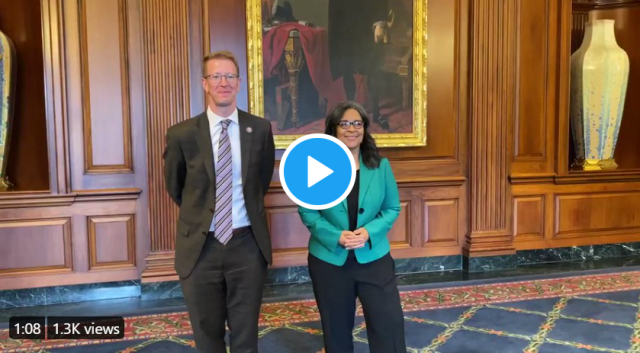An Update on Making Congress Work Better, Restoring Puget Sound, and Supporting Working Families!
Hello, Folks -
Greetings from DC! I hope this update finds you well (and in a cool place – if you’re seeking assistance or a cool spot, check out these resources from across our region!). It’s rare that being in Washington, DC provides me a break from the heat. But after the scorcher of a weekend we just had, I’m admittedly somewhat relieved to be back in our nation’s capital.
Having said that, things are also heating up in Congress. There’s been good progress made on a number of fronts – and hopefully more to come. Let me provide a little sneak preview of what’s to come before looking back at the last couple of weeks.
First, there is increasing hope that Congress will be able to move forward on an infrastructure bill. We know that investing in infrastructure can help put people to work in the near term and lay the foundation for economic growth over the long haul. Plus, historically, these issues have been bipartisan. There’s no such thing as a Democratic road or a Republican bridge. There are blue, red, and purple districts that need better access to clean drinking water and broadband.
In addition, over the next month, the House will be hard at work to pass the appropriations bills. Each year, Congress has to pass bills to fund the federal government. As a member of the Appropriations Committee, that means I’m pushing to meet the needs of our region! I’m championing resources to serve our veterans, funding to recover Puget Sound and restore our salmon populations (more on that below), and support jobs at the shipyard, in our forests, at our national lab, in our fisheries, and on Main Streets across our region. Stayed tuned for my next newsletter for more details on that.
OK… on to the news of the last two weeks!
Making Congress Work Better
In our office, we’re focused on two big goals. First, we focus on making the economy work better for the people I represent. We want to create more economic opportunity for more people in more places. And second, we focus on making government work better – period. Sometimes that means pushing the Veterans Administration to provide better care for veterans. Sometimes that’s through the work of our casework team, which has helped dozens of local businesses access help from the Small Business Administration during this pandemic. Sometimes it’s through championing policy to reform our broken campaign finance system and to protect the rights of voters – as I recently wrote about in The News Tribune.
But those who have received my newsletter over the past couple of years know that I’m also now serving as Chair of the Select Committee on the Modernization of Congress (or what’s commonly referred to as the “Fix Congress” Committee). Our committee was set up with a simple mission – to make Congress function better for the American people.
Obviously, that’s a hefty task. Indeed, it’s strange being part of an institution that – according to recent polling – is held in lower regard than head lice, colonoscopies and the rock band Nickelback (sorry to any Nickelback fans out there). But you’ve probably got a pretty good sense of why that’s the case. Over the years, we’ve seen far too much partisan bickering and far too little progress. We’ve seen government shutdowns and the inability to make progress on some key issues facing our nation. And those watching the House in action (and “inaction” for that matter) may occasionally feel like they’re watching an episode of the Jerry Springer Show.
There are legitimate differences between the two parties. Our nation’s founders presumed that there would be disagreement and conflict. And honestly, that’s OK. But collaboration and civility don’t need to mean selling out your values.
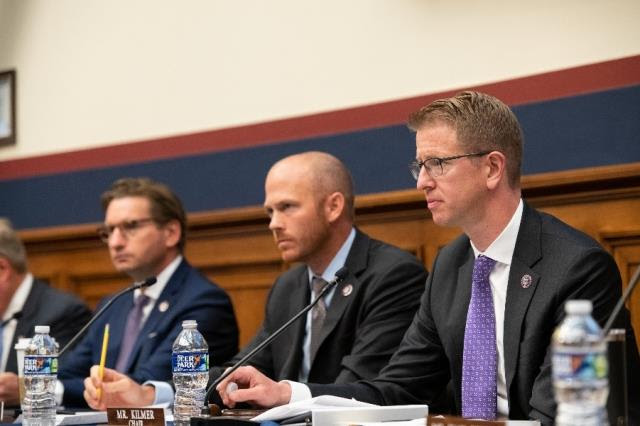
Over the past two weeks, the Select Committee has held a series of hearings with experts in political science, organizational psychology, cultural change, and conflict resolution, who shared examples from their field and “out of the box” ways to help bridge the partisan divide in Congress. These hearings weren’t exactly breaking news on cable news – but they were really important to examine how to improve civility and collaboration in order to make Congress work better for the folks I represent. These hearings left me hopeful that Congress can make progress for our nation.
I encourage you to take a few minutes to check-out the conversations – the first hearing can be watched HERE and the second hearing HERE.
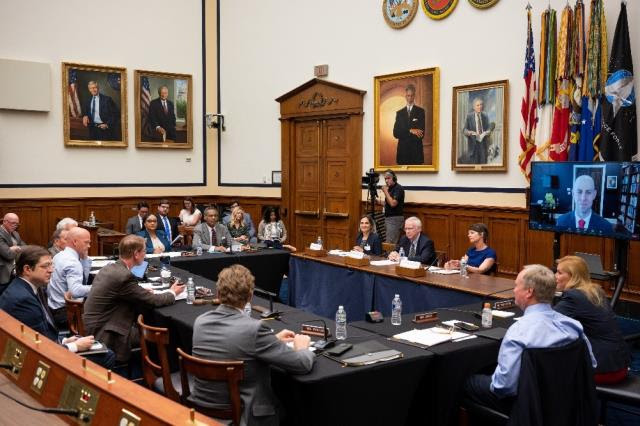
Recovering Puget Sound
As frequent readers of this newsletter know, it’s a top priority of mine to secure more federal support for the recovery and restoration of Puget Sound - our region’s most iconic body of water. Puget Sound is a place on which generations of friends and neighbors have built their lives and made their livelihoods. It’s a critical part of our environment and economy, and home to culturally iconic species like salmon, orca, and Dungeness crab. But we know that if future generations – including my own kids – are going to have those same opportunities to build their lives here, we've got to take action now to protect and restore the Sound.
That’s why, in 2013, I worked with my friend (and now our state’s Lieutenant Governor) Denny Heck to establish the Puget Sound Recovery Caucus as a way of bringing more attention to the urgent need to restore and recover the Sound. Over the years, we have successfully worked to secure additional federal funds to implement projects that improve water quality, protect shorelines, and enhance fish passage and salmon habitat.
Last week, we made even more progress. With strong bipartisan support, the House passed critical legislation I introduced with Rep. Marilyn Strickland that will ensure the federal government lives up to its responsibility to help – the Promoting United Government Efforts to Save Our Sound Act (or the PUGET SOS Act, if you are pro-acronym!).
This bill will ensure the federal government is the strong partner that our region needs to make real progress – and will assist efforts to restore salmon and orca populations, ensure future generations can dig for clams, and uphold tribal treaty rights.
Rep. Strickland and I took a moment to talk about the impact this bill will have on our region – check it out:
There is still plenty of work and significant challenges ahead – but the PUGET SOS Act makes meaningful progress toward protecting this iconic estuary. I’m grateful for Rep. Strickland’s partnership in getting this done. Now it’s time to get this passed by the Senate and signed into law!
Supporting Working Families
As a dad of two kiddos, I know how much our kids learn in the first few years of their lives, and how important that learning is to their success down the road. The COVID-19 pandemic has been tough on working families and on kids, but through the American Rescue Plan, the federal government is making a real investment in our kids and working families – including for local Head Start programs.
Head Start programs across our region promote the school readiness of infants, toddlers, and preschool-aged children from low-income families by offering educational, nutritional, health, social, and other services. These services are provided in centers, family child care homes, or in the family's own home. There’s a wide variety of Head Start programs in our region, including: Head Start for 3s & up – which promotes the school readiness of children ages 3 to 5; Early Head Start – which serves infants, toddlers, and pregnant women; and, American Indian and Alaska Native (AIAN) programs – which aim to honor the rich cultural heritage of our AIAN children, families, and communities.
Last week, I was proud to announce that I helped secure over $2.5 million in grant funding for local Head Start programs in every corner of our region. This critical funding will help ensure that our Head Start programs can continue preparing our kids for success and help parents get back to work.
I will continue to champion early learning and work to ensure children and families have the support they need!
Working for You
Celebrating Juneteenth
I enjoyed joining a great crowd in Bremerton to celebrate Juneteenth! I’m proud to have taken an important vote this month to make Juneteenth a national holiday. It’s important to consecrate this day as a day of remembrance of our nation’s original sin of slavery. It’s important to commemorate this day as celebration of emancipation. It’s important to embrace this day as a day of education and of honoring Black history. And it is important to recognize that first step toward freedom for the ancestors of our Black brothers and sisters that day 156 years ago in Texas. We should indeed celebrate, but also recognize the important work ahead to create a more just and equitable society for all Americans.
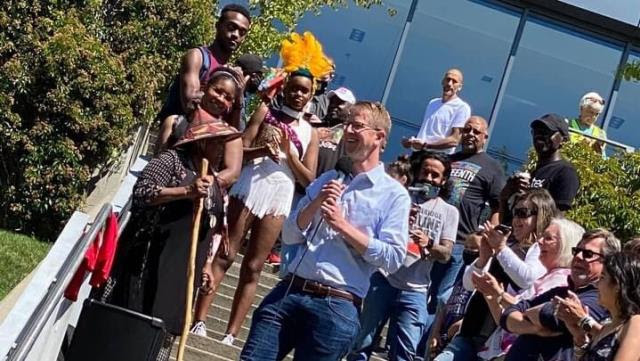
Investing in Our Communities
It was great to tour the Quincy Square Project - which aims to leverage public investment to stimulate economic recovery, growth, and long-term vitality in Bremerton’s downtown business core. I look forward to supporting this work and honoring the legacy of the great Quincy Jones!
Thank you to the excellent teams at the City of Bremerton, Rice Fergus Miller Architecture and Planning, the Historic Roxy Theatre, I Heart Kitsap, Our GEMS, Kitsap County Historical Society Museum, and Emily Russell Landscape Architecture, for the tour and update!
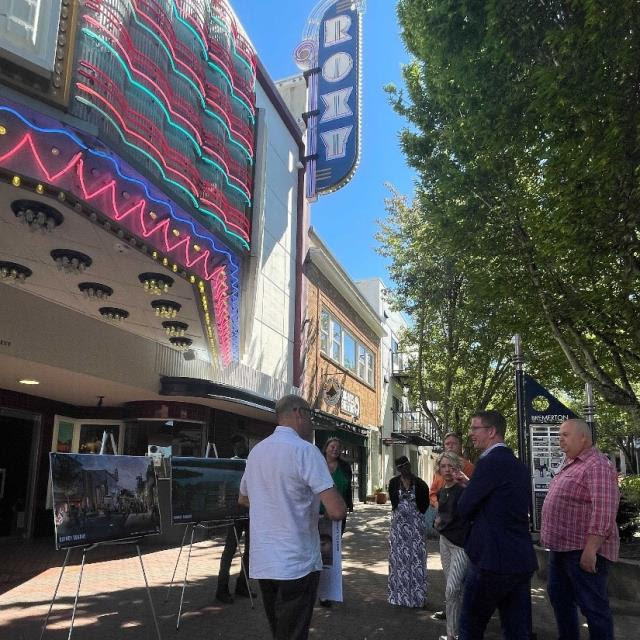
OK – that’s it for now folks! As always, I’m honored to represent you.
Sincerely,

